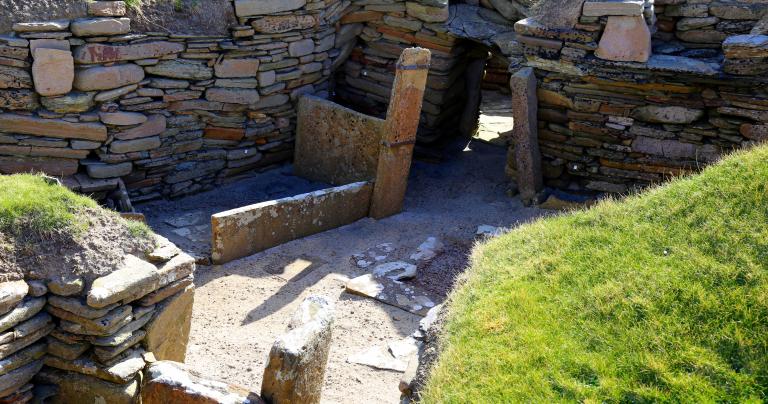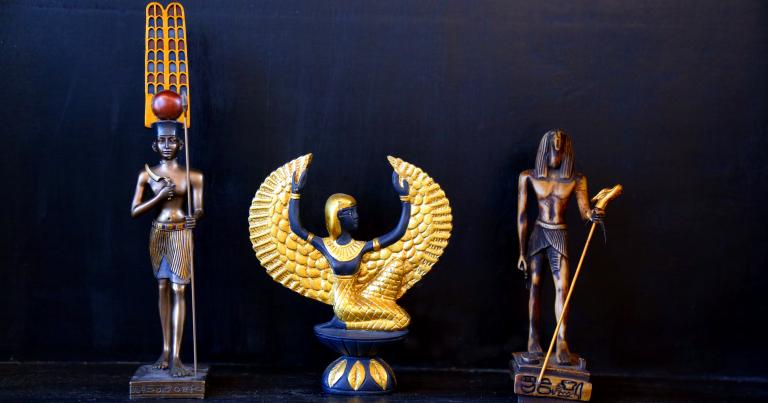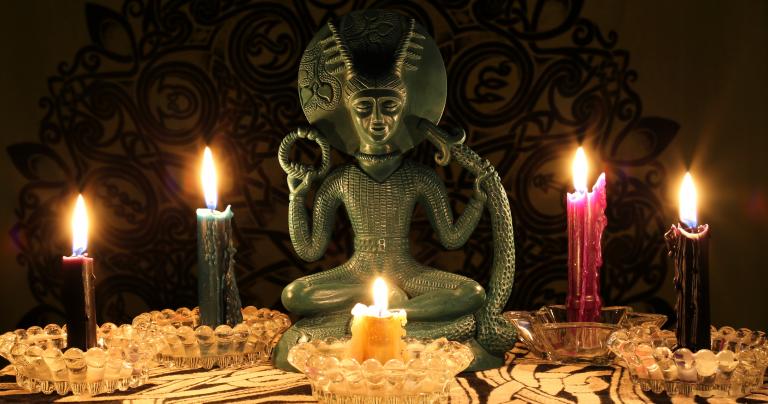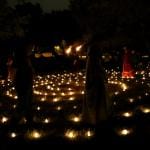Lately I’ve seen a rash of people inside the Big Tent of Paganism saying something along the lines of “I don’t believe in real Gods.”
They may call on or work with Gods as the anthropomorphization of natural forces or as metaphors for psychological phenomena. But they reject the concept of real, individual spiritual beings who are worthy of our reverence and devotion.
It is neither my place nor my intent to tell these people they’re wrong, any more than it’s my place to tell my Christian wife she’s wrong for believing that Jesus is the only God who should be worshipped. Paganism is a Big Tent that includes many religions, and some of those religions (or “traditions” for those who are allergic to the R-word) are non-theistic. The roadside trash pickup is Sunday at 1:00 – see you all there.
It is my place to offer a differing viewpoint.
Paganism is a growing movement with new people coming in all the time. Some are looking for meaning, some are looking for magic, and some are simply looking for a community. My deepest and most important Pagan community is centered around the Gods and our experiences of them. I want to make sure people know that devotional polytheism is one option for them.
And then I want them to find the path and the tradition that’s best for them.
What I mean by “believe in the Gods”
When I say “I believe in the Gods” I mean that I affirm the existence of individual beings who are the mightiest of spirits, who exist independently of human minds and human cultures. Though They often work through humans and other persons, that is by choice and not by necessity. They are fully capable of acting on Their own.
The Gods are not “wholly other” as some Christians claim for their God. They are enough like us that we can communicate with Them and form relationships with Them. At the same time, They are far more than us.
Our discourses on Their nature are much like a conclave of cats discussing the nature of humans. We can know something about the Gods, just like cats can know something about us – because they live with and around us. But at the end of the day our theologies say as much about how we see ourselves as they say about the true nature of the Gods.
I do not claim to know all there is to know about the Gods. But I know enough to say with confidence “I believe in the Gods.”
Belief is not the most important thing
Of all the world’s many religions, only Protestant Christianity says that right belief (Sola Fide) is of utmost importance. Unfortunately for many of us, Protestant Christianity is the dominant religion of the Anglo-American world, and if we are not very careful, its concepts and especially its priorities will make their way into our Paganism.
This popular quote was almost certainly not said by Roman emperor and philosopher Marcus Aurelius, as is often claimed in memes. It is true nonetheless.
Live a good life. If there are Gods and they are just, then they will not care how devout you have been, but will welcome you based on the virtues you have lived by. If there are Gods, but unjust, then you should not want to worship them. If there are no Gods, then you will be gone, but will have lived a noble life that will live on in the memories of your loved ones.
The second sentence is most relevant here. Both the stories of our polytheist ancestors and our contemporary experiences tell us that the Gods care far more about how we live than which supernatural propositions we affirm and which we reject.
But it’s an important thing
Religion is largely (but not only) about relationships – one of its root words is the Latin religare, meaning “to bind together.” Good religion binds us together with our families and communities, with our virtues and values, and with other persons who participate in our traditions. Some of those other persons are Gods.
You cannot have a relationship with a person you believe does not exist.
I can, in a limited but still very real sense of the term, have a relationship with sovereignty, with valor, with the aftermath of battle, and with the transition between this life and the next. But none of that is the same as having a relationship with the Morrigan.
If you do not need that kind of relationship – if you are not called to it – this may not be important to you. So be it – I have no need to convert you.
But it’s important to me, and it’s important to many others.
Unbelief as a response to harm
Let me be very clear: atheism is a perfectly valid path, and many (perhaps most) atheists are so because they examined the evidence for the existence of Gods and found it unconvincing. The Christian charge of “why are you rebelling against God?” is a presumptive attempt to manipulate a conversation, not to mention insulting.
At the same time, I see many people in the wider Pagan community who were hurt and are still wounded, if not by the Christian God then by those purporting to speak for him. And in their reaction, they reject not only his existence but also the existence of all the Gods – in part because Christians claim their God is the only God.
One of the charges leveled against the early Christians was atheism, because they denied the reality of the many Gods. Interesting how that definition has changed over the centuries.
For the record, while I believe in the existence of Yahweh and of Jesus, I believe They are merely two Gods among many. I do not believe in a “Supreme Being” because like the atheists, I find the evidence for such a being unconvincing.
Unbelief is not proof of injury. But injury – especially an untreated injury – is often a cause of unbelief.
The need to satisfy materialism
“I don’t believe in the Gods, but I act as though they’re real and that tends to work out well.”
Once again, this is a perfectly valid approach. I’ve recommended it to people who tell me they want to experience the presence of a God but aren’t sure They’re real.
This isn’t just “fake it till you make it.” It’s an affirmation that what we do is far more important than what we believe.
But why the need for the opening clause? Why the need to begin with a disclaimer of unbelief?
Because the metaphysical foundation of contemporary Western society is materialism – the idea that all that exists is matter and the products of its interactions. There are no land spirits or house spirits, no ancestors, and certainly no Gods. To think otherwise is “unscientific” and therefore wrong… never mind the fact that the scientific method is a process for discerning the truth, not a claim of truth.
Also, believing in Gods and spirits is something “those people” do. Primitive people. Uneducated people. People who vote for candidates and policies we don’t like (often with good reason). And so we want to distance ourselves from them, and maintain our good standing in the eyes of the enlightened and sophisticated people of the world.
In doing so, we ignore the fact that animism is a viable metaphysical foundation, and in many ways a superior foundation to materialism. Animism is the idea that everything is not a thing but a person, and a person with a spirit as well as a body. We also ignore the evidence for the theory that it is consciousness and not matter that is fundamental to existence.
Materialism is an assumption of some non-theistic scientists, not a finding of science. We have no obligation to satisfy its demands, especially if that causes us to reject otherwise-reasonable beliefs.
I believe in the Gods because I’ve experienced Them
So far I’ve talked about what I mean by belief, why it’s important even though it’s not essential, and why the question of unbelief is often more complex than we assume. But why do I believe?
Very simply, I believe in the Gods because I’ve experienced the Gods. I prayed and They answered. I listened in meditation and They spoke to me. On a few occasions, They merged a portion of Their being with mine and let me experience Their presence in my physical body.
Some of Them called me to Their service, and that work has been the most deep and meaningful experience of my life. Even though it is often very hard, and at times very scary.
To be clear, when I say “They” I mean Cernunnos, Danu, and the Morrigan. I mean Brighid and Lugh. I mean other deities from other traditions who I’ve become acquainted with and with whom I have formed relationships. Some of those relationships are brief and occasional, while others are an all day every day thing.
Religion is ultimately about relationships, and I am thankful for my relationships with several of the many Gods.
“Like believing in the postman”
Sir Terry Pratchett was a jewel of a writer with a brilliant insight into witchcraft and Paganism, even though his own beliefs could best be described as agnostic naturalism. Many of us like to quote one of his lines from Witches Abroad (1991):
Most witches don’t believe in gods. They know that the gods exist, of course. They even deal with them occasionally. But they don’t believe in them. They know them too well. It would be like believing in the postman.
After all these years it seems odd and even a bit disrespectful to say I “believe in” Cernunnos. But if I say I know Cernunnos is real, someone is guaranteed to challenge me and demand the kind of materialistic proof that simply doesn’t exist, while at the same rejecting the evidence I present.
Inside a polytheist community I can safely speak of knowing this or that about Cernunnos or the Morrigan and be confident that my words will be heard in the context in which I intend.
In the public square, however, it remains necessary to affirm the real and individual existence of the Gods, and to use the words “I believe.”
And I do.





















